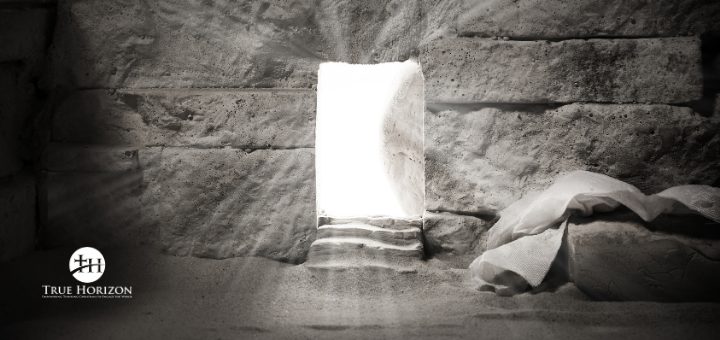The Resurrection Is A Historical Fact
Jesus of Nazareth died on a Roman cross, then resurrected from the dead three days later. It’s not just a fairy tale. Christians believe that the Resurrection is a historical fact. It’s what sets Christianity apart from every other world religion. It is the foundation of the Christian faith. If it’s not true the New Testament is fiction, Jesus is a fraud, and Christianity is a false religion. Anyone would be a fool to believe in it. This isn’t just my opinion. It’s the Apostle Paul’s:
1 Corinthians 15:12-19 — “… if Christ has not been raised, our preaching is useless and so is your faith. More than that, we are then found to be false witnesses about God, for we have testified about God that he raised Christ from the dead. But he did not raise him if in fact the dead are not raised. For if the dead are not raised, then Christ has not been raised either. And if Christ has not been raised, your faith is futile … [and you] are to be pitied more than all men.”
None of us wants to be foolish or pitied for our faith. And no one wants to follow, or encourage others to follow, a false religion. So what reasons do we have to believe this story? It turns out there are several.
Impact Events
Just outside the cockpit door of every commercial airliner, there is a telephone handset that allows the flight attendants to talk to the pilots. And inside the cockpit of every commercial airliner is a “Door Unlock” switch on the center console that allows the pilots to open the cockpit door without getting out of their seats.
If a flight attendant had knocked on my cockpit door at 8:45AM on September 11, 2001, and asked me if she could come up front, I would have unlocked the door while I was still on the phone with her. I wouldn’t have hesitated for a second. But by 9:15AM that same morning, the passengers of United Flight 93 had already figured out that was a bad idea. They were storming the cockpit of their Boeing 757 over southern Pennsylvania for that very reason.
What changed during those thirty minutes?
We all know what changed. The collective mindset of the entire world changed. It’s called an “Impact Event” — an incident so shocking it has the power to change not just what we think, but the way we think … about everything.
Resurrection – The Cultural Backdrop
In the first century A.D., there were several different kinds of beliefs about life-after-death in the Egyptian and Greco-Roman worlds that surrounded Israel. The Egyptians mummified people with their stuff so they could use it in the afterlife. The Greeks and Romans believed in various forms of an underworld destination. But no one anywhere believed in the idea of a bodily resurrection occurring after a person died.
The Jews weren’t any different. Their views varied by theological sub-group. The Essenes’ views were similar to their neighboring pagan cultures. They believed in a single-stage disembodied immortality — a “soul” that continued on into an “afterlife.” Their view didn’t include any kind of bodily resurrection. The Sadducees did not believe in any kind of life-after-death at all. The Pharisees did believe in one form of a “resurrection.” But theirs was a group event that they thought would occur for all God’s people. The righteous would rise bodily together at the end of time.
Not Even In Myth
In other words, there were plenty of different ideas about what happened to people after they died. But the Jews and their pagan contemporaries agreed about one thing — that the idea of a bodily resurrection was complete rubbish.
“This basic tenet of human existence and experience is accepted as axiomatic throughout the ancient world; once people have gone by the road of death, they do not return. When the ancient classical world spoke of (and denied) resurrection, there should be no controversy about what the word and its cognates referred to … ‘Resurrection’ was not one way of describing what death consisted of. It was a way of describing something everyone knew did not happen: the idea that death could be reversed, undone, could work backward. Not even in myth was it permitted.”
~ N. T. Wright, The Resurrection Of The Son Of God
The New Paradigm
Then, suddenly, everything changed. Despite every commonly-held belief to the contrary, one group of people began believing in a bodily resurrection. They were the first-generation Christians. For some reason, a large group of these people turned on a dime. They started saying that a person could be resurrected. In fact, they claimed that someone had done just that. And they described a resurrected person as having some kind of weirdly transformed physical body. These Christians started using the term “resurrection” in ways they had never used the term before. They talked about it in the present tense.
The New Church
The idea of a resurrection had been a tangential doctrinal variant for the Jews. But, for some of them, it morphed overnight into the central tenet of their faith. Opinions about life after death had been all over the map. But suddenly Christians were remarkably unanimous about one thing: The Resurrection of Jesus of Nazareth.
And that changed everything else.
Their Jewish religious and Temple worship rites weren’t exempt. They went from practicing animal sacrifice to preaching on Christ’s sacrifice. They claimed that the binding Law of Moses had been fulfilled. That baptism and communion had replaced circumcision as the symbol of their faith. They even changed their weekly day of worship from Saturday to Sunday.
It was like the world had experienced some kind of cataclysmic Impact Event.
Because it had.
The Resurrection is History
These rapid, sweeping changes in thinking and habits are documented history. And that is what makes Christianity so unique. It’s not just a “faith system” or a list of rules for healthy living. And it’s not a self-help program based on having a friendly relationship with God. Christianity is based on an epic story. But the story is true. It’s historically verifiable. And the central event in the story is the Resurrection of Jesus of Nazareth.
The truth of Christianity lives or dies (pun intended) on the Resurrection. If you want to falsify the Christian story, just prove that Jesus never rose from the dead. That is the point the Apostle Paul was making in 1 Corinthians 15. If the Resurrection of Jesus was not an actual, historical event, you can dismiss us Christians as fools.
But if it was, you should bend your knee to the risen Messiah.
As I’ve discussed many times, the definition of truth is “correspondence to reality.” Does what we believe about something match the way the world really is? If it does, that belief is true. And that means that if we believe the Resurrection is true we should have solid historical evidence for it from the real world. Is there any?
You bet there is.
Evidence Please
The evidence doesn’t depend on your religious point of view. It’s the same kind of evidence mainstream historians use to evaluate any kind of historic event. You take the evidence you have and look for an explanation that takes all of it into account.
The first bit of evidence is the New Testament itself. If you evaluate it in the same way you would evaluate any set of ancient documents, the conclusion is simple. The New Testament documents are historically reliable. This really isn’t even debatable. The evidence is overwhelming. But think about the origins of these documents. Who wrote them, and why?
The answer to both those questions is so obvious it blows my mind that I, as a confessing Christian, missed it for decades.
The New Testament was written by people whose lives were turned upside down by the Resurrection of Christ. Their writings weren’t just fanciful musings. The authors wrote down what they saw. And they wrote those things down because of the Resurrection,
The Resurrection came first. It’s why we have a New Testament.
So, we have highly reliable historical documents. And those documents record an Impact Event unlike any other. Billions of people have died throughout history. But the world has only reset its entire calendar system in honor of one life. That’s the ultimate kind of Impact Event. And it’s powerful evidence for the historicity of the Resurrection of Jesus.
The Minimal Facts Approach
The New Testament writers experienced the Impact Event and wrote about what they saw. But they weren’t the only ones. Other historians witnessed the effects of the Resurrection too. And their accounts corroborate the New Testament authors’ stories. For that reason, there are several elements of the story that even its critics admit are undeniable. These are mainstream historians who overwhelmingly agree to the veracity of five facts tied to the Resurrection. Dr. Gary Habermas, a world-class PhD Bible scholar, calls these the “Minimal Facts.” And he has popularized an argument based on them.
Here are the five central elements of the Resurrection account that even Christianity’s opponents admit are historically accurate:
- Jesus of Nazareth died by crucifixion on a Roman cross.
- Jesus’ disciples believed that he appeared to them after he had died.
- Paul, the church persecutor and sworn enemy of Christianity, was suddenly changed into its greatest advocate.
- James, the brother of Jesus, suddenly dropped his skepticism and became the leader of the Jerusalem church.
- The tomb where they buried Jesus on Friday was empty on Sunday.
Since there is overwhelming agreement to these, Habermas’ “Minimal Facts Approach” simply says that the conclusion we draw about the Resurrection must be based on an “inference to the best explanation” for all these facts.
I’m not going to get into the details of each right now, but here’s the point: The only all-encompassing explanation for all five of these facts is that that Resurrection actually occurred.
A Reason To Believe
The New Testament writers penned their manuscripts for a reason. They believed that something cataclysmic had happened. And it doesn’t make sense to say they conspired to concoct the story. Every single one of them went to his grave without recanting the story they shared. Most of them were executed for that very reason. It strains credulity to say they were willing to suffer and die in defense of a story they knew they had made up.
Taking all this into account, it is perfectly reasonable to say the Resurrection is a historical fact. If you can say that about any historical event, you can say it about this one.
And yes, that means a miracle occurred. So, those who deny that miracles are possible can’t just dismiss the Resurrection as being “religious.” Of course it’s religious. But it’s also historical. The evidence is clear. They can doubt all historical claims. Or they can be reasonable and rethink the presuppositions that led them to reject miracles in the first place.
Here is a short summary of some of the “Minimal Facts” about the resurrection:
… and there is plenty of evidence to support each one of these facts:




Thanks again Bob for another well written article. The last point you made is the same one I make when speaking to skeptics. That is, if you don’t believe in the historical account of the resurrection of Jesus, you can’t believe in any event in the past, that you haven’t personally witnessed. Not the accounts of Alexander the Great, not even George Washington. Our courts recognize eye witness accounts, particularly corroborated ones with multiple sources, as enough evidence to convict an indicted person. That puts a serious amount of weight on eye witness accounts.
Another point you made as do I, is that no one willingly dies for what they know to be a false narrative. Some will die for a false narrative that they believe to be true. I had a skeptic just a couple days ago say to me, “what about Muslims who blow themselves up”. I told him he was comparing apples to oranges. The difference is, that the eyewitnesses to the resurrection, saw, touched, talked, and ate with Jesus. They were eyewitnesses.
Have you heard of Sir Lionel Luckhoo? His bio. is another point I frequently bring up, when I’m challenged on what constitutes credible evidence. Here is a condensed treatise for anyone who hasn’t heard of him.
Have a blessed Easter Bob
Did Jesus Really Rise From the Dead? The most successful lawyer in history was Sir Lionel Luckhoo. If you go to Guinness World Records under “Most Successful Lawyer” his name is there. As a defense attorney he won 245 murder trials in a row either before a jury or on appeal. He died in 1997 at the age of 83 after a distinguished career. http://www.hawaiichristiansonline.com/sir_lionel.html. What kind of skill do you need to achieve this level of success? He must have such tremendous analytical powers that when the prosecutor presents what appears to be an air-tight case against his client, he was able to find the flaws. He must be able to know what to ask to make a case fall apart. He must know what constitutes reliable and convincing evidence. All this was true of Sir Lionel Luckhoo, twice knighted by Queen Elizabeth. He became a noted diplomat and a member of the highest court in his country. There is one tough question at the center of Christianity, “Did Jesus really rise from the dead?” Wouldn’t it be great if we could have the legal opinion of Sir Lionel Luckhoo about the resurrection? Well, we do. Sir Lionel Luckhoo was challenged to take his legal powers of analysis and apply them to the resurrection of Jesus Christ. He spent years studying the historical record. Here is his conclusion. “I say unequivocally that the resurrection of Jesus Christ is so overwhelming that it compels acceptance by proof which leaves absolutely no room for doubt.” Sir Lionel Luckhoo We know the dead don’t come back to life. Here’s a man who studied the record and applied the legal test of evidence and came to the conclusion that Christ did return from the dead. Let’s examine some of the evidence that convinced Sir Lionel Luckhoo, because the resurrection is the heart of Christianity. If there is no resurrection of Christ, there is no Christianity. Paul wrote in 1 Corinthians 15:17, “If Christ did not rise, your faith is futile and your sins have never been forgiven.” This is an important issue. The fact that Jesus returned from the dead authenticated His claims of being the one and only Son of God. If that is true, then He deserves our worship and allegiance.
Thanks, Jerry. I hadn’t heard of Lionel Luckhoo. That’s good stuff. I will check him out. Along those same lines, if you haven’t heard of J. Warner Wallace, he is a cold-case homicide detective in L.A. who was a nasty atheist (his description). But he applied his cold-case detective skills to the New Testament and examined the evidence. Long story but today he is a powerful Christian apologist. Check him out at: https://coldcasechristianity.com/
Aside from faith in the veracity of the gospels, do you consider there is any evidence for the claim regarding the resurrection of Jesus and if so what is it?
Thanks.
Ark.
Thanks Bob I will check his story out. Same thing with Lee Strobel.
Hi, Bob. Great article. I posted the link because I liked it so much.
Thanks for doing that, Ellen! And thanks for reading. Happy Easter and love to all the Burns clan!
I read your comment on Gary’s blog and thought you might be more amenable to dialogue on your own blog where you have control over content.
Aside from faith in the veracity of the gospels, do you consider there is any evidence for the claim regarding the resurrection of Jesus and if so what is it?
Thanks.
Ark.
If you’re looking for evidence for the claims regarding the resurrection, how do you dismiss the willingness of Jesus’ disciples to die instead of recanting their claims, the rise of the church to prominence in the Roman world within 300 years, the complete transformation of many devout Jews into Jesus worshipping Christians, the change of the Sabbath from Saturday to Sunday, the acceptance of a new calendar … it’s a cumulative case argument. I’d love to know how you explain ALL of those events occurring simultaneously.